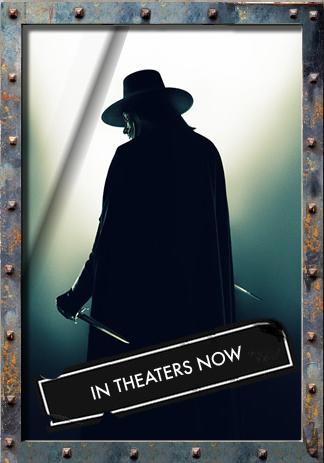|
Been there, done that
by Mike Baron The stretch of comic book movies extends as far as the eye can see. The latest is V for Vendetta, based on Alan Moore's comic. Moore wrote V as a reaction to Thatcherite England, where his perfervid imagination extrapolated the usual leftist fears: rise of intolerant Christianity, no more freedom of press, war on homosexuality, etc. More or less what Howard Dean's been saying. But this is no longer the eighties and Thatcher is no longer in charge. The distance between Moore's fantasy and today's reality is vast. 
© 2006 Warner Brothers This has not prevented the Wachowski Brothers from turning Moore's passionate cry into a club with which to beat the usual suspects. And conservatives have got their panties in a bundle because V glorifies a terrorist trying to blow up Parliament. Ironically, there is not a whiff of Islam in this movie except for a Koran that belongs to a saintly gay television broadcaster (Stephen Fry), the only character blessed with a personality. V for Vendetta is hardly a cry for world revolution. As the movie demonstrates in its opening moments, this isn't the first time someone has tried to blow up Parliament. V is a revival of Guy Fawkes, who tried to blow up Parliament in 1605 as a protest against anti-Catholic laws. Not exactly what Moore's V has in mind. V lacks tension because we don't really care about the characters. None of them seem to have a life outside politics, except for the Stephen Fry character. V is hampered by having to wear a rigid mask throughout. He has some good dialogue but he never comes alive as a person. It's not just the mask. It's his methods and behavior. His treatment of his acolyte Evey (Natalie Portman) is brutal. The final destruction of Parliament seems gratuitous, coming as it does after V has won every battle, seen the dictator shot, the army stand down, and the citizenry rise up, all of them wearing Guy Fawkes masks. The logic of Hollywood demands a big explosion. Between the blowing up of the Old Bailey which begins the movie and the destruction of Parliament is a serpentine tale of government conspiracy to wipe out half the citizenry via a lab-created plague, thereby creating the situations for dictatorship. That's right. The ol' Secret Government Lab. The government can never control these things so the plague also creates the seemingly indestructible V. As Chancellor Sutler (John Hurt) railed unblinkingly at his cabinet I couldn't help but compare V to the far superior Richard III starring Ian McClellan. Both posit England with the trappings of Nazi Germany. It is unfair to compare the Wachowski Brothers to Shakespeare, but the comparison is useful. Richard III succeeds because it is a timeless tale. V fails partly because it is linked to such a specific time and place. It is instantly quaint. It is not Christians who are running amok through the streets of England. But it mostly fails because we don't give a damn about these characters and we never want to see any of them again. I didn't believe V with his cumbersome knives could take down a room full of soldiers with automatic weapons. Pictures of his knives whirling through the air in slo-mo defy the laws of physics. Modern ammo would have gone right through his medieval cuirass. Natalie Portman acquits herself well in a thankless role. She appears to be the size of a large house cat. She badly needs to do a romantic comedy to clear her palate of all this sci-fi junk.
Visit our Comic Book News Archive. |

